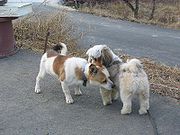
Dog Odors
Veterinarian Reviewed on June 17, 2012 by Dr. Janice Huntingford
Canines, like all other mammals on earth including us humans, emit natural body odors as a normal part of living. Similar to people, some of these odors, if left unattended to, can evolve into rather unpleasant aromas. There are also a number of reasons for the presence of unnatural dog odors, which are usually far more pungent in comparison to natural causes.
Causes of Natural Dog Odors
Natural or normal instances of dog odor are usually emitted from areas like the ears, anus, and the pads of a dog’s paws. The secretion of scents is extremely important in the animal kingdom as different species, like the canine, use these smells to mark their territory, recognize another dog’s territory, as well as for simply recognizing one another.
Like all carnivores, dogs also have two anal sacs, or scent glands, which communicate with the surface of the dog’s skin by ducts that open on either side of the dog’s anus. These sacs are wrinkled with both apocrine and sebaceous glands that produce a natural secretion, which contains a musty odor, whenever a dog defecates. It is believed that this secretion is left by the dog as a signal to other dogs to help them identify the source. This is the case when dogs who are first introduced to each other, promptly sniff each other’s anal areas.
These anal glands can sometimes appear swollen and are unable to drain themselves naturally. Your dog may demonstrate excessive licking or biting of his anal area. This will require either a visit to your veterinarian or to your groomer to have the anal glands expressed.
While dogs do not have sweat glands that serve the purpose of keeping the body cool as it does in humans, their sweat glands, known as apocrine glands, are all over their entire bodies near their hair follicles. Scientists have yet to discover the full and exact reason for these particular glands; however it is suspected that one of their purposes is for secreting pheromones which act as chemical signals used to communicate with other animals and dogs.
Dogs also have quite a few apocrine glands in their external ear canals where they are referred to as ceruminous glands. In addition, a dog’s ear canal is also home to many sebaceous glands. Together, these two types of glands produce ear wax (cerumen).
This is a prime location for microorganisms to thrive and will usually emit a yeast-like odor even when the dog is quite healthy. However, when the ears are infected, these glands will give off a very strong disagreeable smell to say the least. Breeds of dog with large, floppy ears are more prone to infections as the signs of early inflammation are usually hard to see.
Another type of sweat gland in dogs, that may cause odor, are known as eccrine glands, which are located on the pads of the paws and around the nose. During normal glandular activity, these eccrine glands work to keep a dog’s nose and paw pads moist in order to maintain their functional purpose. This natural dog odor is more evident in dogs that have moist paw pads than on dogs whose paw pads are dry.
Flatulence is, of course, a natural bodily function, but as some pet owners know too well, it can be a rather noticeable problem for some. Some passing of gas is merely diet related while other instances might be an indication of some type of gastrointestinal disease, making it important to check with your veterinarian if you notice excessive or foul smelling flatulence from your dog.
Yet another source of natural dog odors are caused by the dog’s behavior, such as rolling around in the mud, dirt, or the droppings of other animals, or far worse, coming in contact with the dreaded skunk.
Unnatural Dog Odors
One of the most common causes of unnatural dog odors stems from poor grooming, especially dogs with long or thick fur. If a dog’s coat is not kept clean and free from debris with regular brushing and bathing, odors are inevitable thanks to the buildup of smelly bacteria.
Allergies and some other skin conditions and diseases can also cause unnatural smelling odors. The condition hyperhydrosis in which a dog’s apocrine glands are overactive encourages the growth of yeast and bacterium leading to infection. Breeds of dogs with deep folds in the skin, like those on the face of a Bulldog, are also prone to odor causing bacteria and yeast infections.
Otitis, Dog Ear Infections, are another common source of unnatural dog odors with smells ranging from the mildly unpleasant to the incredibly offensive.
Dental disease as well as mouth ulcers can also cause foul odors in the form of Dog Bad Breath, and there are even some medicated shampoos and oral medications, like antibiotics, that can case unusual or noticeable odors on your dog.
An abscessed or infected anal sac or a condition called anal sac disease will also cause foul smelling odors and should be examined and treated by a veterinarian.
Sign up for our newsletter and receive more articles and the latest pet health updates and special offers.
Our Expert
 Dr. Janice Huntingford
Dr. Janice HuntingfordJanice Huntingford, DVM, has been in veterinary practice for over 30 years and has founded two veterinary clinics since receiving her Doctor of Veterinary Medicine at the Ontario Veterinary College, University of Guelph. She has studied extensively in both conventional and holistic modalities. Ask Dr. Jan

